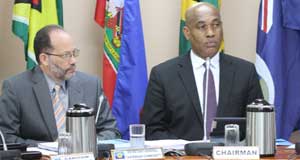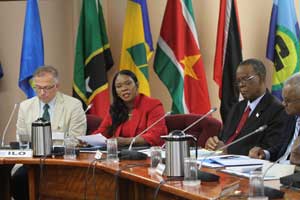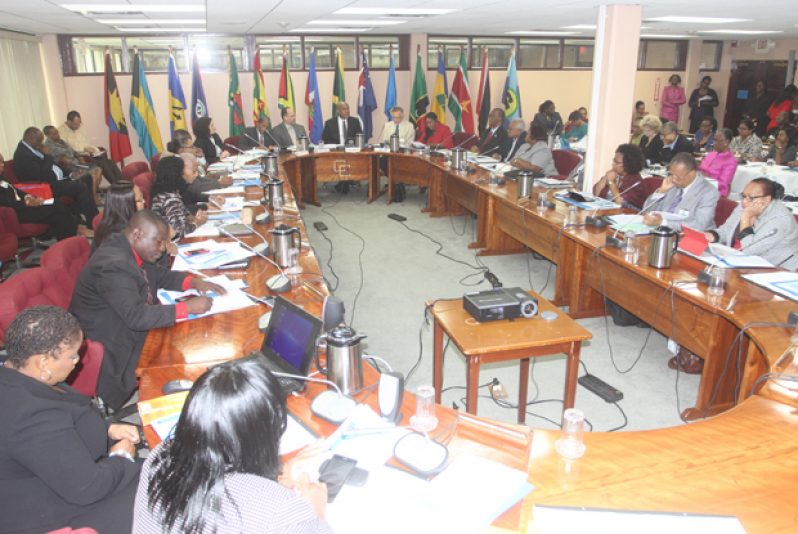THE 26th meeting of the Council for Human and Social Development (COHSOD) opened yesterday at the Caribbean Community (CARICOM) Headquarters, Turkeyen, Greater Georgetown.


Chair of the Council, Montserrat’s Minister of Health and Social Development, Mr. Colin Riley said it is an opportunity for those with responsibility for labour and gender to examine, jointly, important issues related to the achievement of sustainable development of the region.
“…it provides us with the opportunity to re-examine our own roles in the new strategic directions being outlined for our Community; to recognise and take advantage of functional cooperation among CARICOM Member States to advance our national agendas and, most importantly, to make a difference in the lives of the people of the Region as we work towards making this truly a Community for All.”
The two-day forum will see ministers with responsibility for labour, gender and social development across the Region, as well as representatives of regional institutions and labour and private sector bodies discussing several issues with a view to outlining regional positions in preparation for the Third Global Conference on Small Island Developing States (SIDS) in September, the International Labour Conference in June and the negotiations related to the development of the post 2015 Global Development Agenda.
The COHSOD will also review progress made on implementing the Caribbean Single Market and Economy (CSME) and will be invited to consider research findings on the gender impact of it, with a view to identifying priority legislation and policies, as well as recommending actions to be taken by Member States to advance gender equality principles throughout the process.
Human resource development will also be a major topic for discussion and focus would be placed on developing and employing youth.
The Council is to focus, as well, on Technical and Vocational Education and Training (TVET) in the context of the revised Regional Strategy for Workforce Development and Economic Competitiveness and also consider the priorities outlined by Heads of Government for building a digital economy, with specific reference on measures to build relevant skills and competencies.
Additionally, the planned implementation of a CARICOM platform for Labour Market Information System, which is expected to enhance the management of the free movement of labour within the CSME, will also be on the agenda.
Paradigm shift
In light of the expansive programme, the COHSOD Chair called for a paradigm shift that takes cognisance of the inextricable linkages and interdependence within, between and among the economic, social and environmental facets of development.
He said: “If we are to be successful in implementation of this conceptual model of development, then there needs to be a significant shift in the way in which we do business, both nationally as well as regionally.
“Economic and social development, for example, must be addressed simultaneously as they are mutually reinforcing; the latter is not merely derived when the former has been achieved.
“The policy coherence so necessary across economic, social and environmental policies implies, among other things, increased inter-sectoral coordination among government departments and institutions and the inclusion and meaningful participation of non-state actors, private sector and civil society, in governance and decision making. Together we will examine legislative, policy and other options for advancing the work in these major areas,” he assured.
Riley underlined the examination of what a new and ever emerging environment demands in terms of skills and competencies of the workforce, as work itself, and skills are continually being redefined and reorganised.
He acknowledged that: “Over the past decade, the region has made great strides in the reorienting of technical and vocational education and training, with the shift from a supply driven to a demand led system with the establishment of a system of Caribbean vocational qualifications, which has made available, to employers, persons more readily employable and which has facilitated movement of certain categories of workers in the Single Market and Economy.”
However, Riley maintained that there is still a long road ahead, as efforts continue towards putting the system on a firmer footing in some Member States, thus ensuring that it does not become, in itself, a means of exclusion of some from the regional Labour Market.
Key questions
He went on: “Some of the key questions relate to whether systems for education and training are preparing persons for the new workplace and for entrepreneurship; whether issues of cost and access to technology are creating new and greater divides and social exclusion and whether information and intelligence related to existing and emerging opportunities in the labour market are available to economic and education planners.”
Riley said that, within COHSOD, there has been significant effort at inter-sectoral consideration of issues but this is not always mirrored at the national level and, sometimes, renders the regional initiatives less effective.
“This meeting, for example, turns the spotlight on gender issues, especially in the context of the implementation of the Single Market and Economy and also with regard to the decent work agenda and human resource development. Within the regional arrangements, there should, perhaps, be some room for joint meetings of the Ministerial Councils in order to effect the policy coherence deemed imperative.”
He pointed out that the outcomes of these processes will continue to guide development cooperation and assistance at all levels, as the Millennium Development Goals (MDGs) did.
Riley explained: “The Post 2015 Development Agenda is intended to address the economic, social and environmental aspects of development in a holistic manner.”
Quoting from a UN Task Team on Human Rights report, he said: “The narrow models of economic analysis that characterised development approaches in the pre-2015 period have proved inadequate in many respects. It should, by now, be seen as axiomatic that economic growth, where accompanied by significant inequalities, environmental degradation, repression and structural indignities, is neither sustainable in the long term, nor morally acceptable in the immediate term. Nor can a focus on any narrow and selective set of socio-economic indicators satisfy the real demands of development.”
Riley said, even as the Region prepares itself for participation in these fora in order to ensure that the regional priorities for development are taken into account, it does so against the backdrop of a combination of challenging circumstances, including that of climate change and the global financial crisis.
The upcoming forums were also recognised as opportunities for CARICOM Secretary-General, Ambassador Irwin LaRocque.
In his remarks yesterday, he said: “This meeting of the COHSOD comes at a time when, at the national level, we are assessing the achievements of the Millennium Development Goals and the Beijing Platform for Action.
“…it also coincides with a period in which the Community has been engaged in strategic planning to determine our priorities for the immediate future and position our Region to build the resilience so necessary to withstand the various challenges which we confront.
“…as a Region, we are seeking to define and position CARICOM priorities within the new global framework for the Post-2015 Development Agenda, the SIDS Agenda and the Beijing+20 Agenda.”
Moving toward
To this end, LaRocque urged his audience to prioritise considering the direction in which the Community is moving toward.
He said: “The issue of prioritisation is critical and the COHSOD, like all the other Ministerial Councils, must determine which of its several issues of specific concern it wishes to prioritise.
“In our Region, there is significant unemployment and under employment existing alongside acute skill shortages in some key sectors of our economies.
“The lack of access to technology by many of our young people has the potential to widen both the employment and poverty gaps and this needs to be addressed.
“In addressing these issues, this Council will have to take into account the need to ensure that our human capacity development becomes more relevant to our society’s needs in the context of the priorities established within the Strategic Plan.”
The Secretary-General encouraged participating stakeholders to recognise the imperative to engage the Region’s youth in ways that will use their innate creativity to contribute to their own development and prospects for employment.
“There remain some issues to be addressed,” he admitted, emphasising that initiatives like the implementation of a Labour Market Information System will assist in alleviating the situation.
La Rocque was optimistic that the deliberations and recommendations of the Council over the course of its meeting will provide guidance and, in so doing, contribute to the economic and social development of the Region.
Representing Guyana at the meeting continuing today are Minister of Labour, Dr. Nanda Gopaul and Minister of Human Services and Social Security, Ms. Jennifer Webster, as well as officials from both ministries.
Minister Webster, in brief remarks, emphasised the Guyana Government’s commitment to the work of the CARICOM Secretariat and the moves being made, through various initiatives, to strengthen mechanisms that support the process of regional integration.
She also alluded to the importance of the issues for discussion by COHSOD in advancing socio-economic development at the national and, by extension, the Regional levels.
Written By Vanessa Narine





.jpg)








